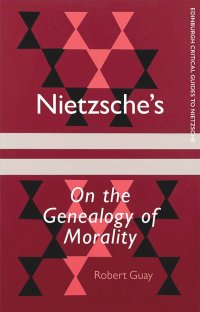
Ebook: Nietzsche's "On the Genealogy of Morality": A Critical Introduction and Guide
Author: Robert Guay
- Genre: Other Social Sciences // Philosophy
- Series: Edinburgh Critical Guides to Nietzsche
- Year: 2022
- Publisher: Edinburgh University Press
- Edition: 1
- Language: English
- pdf
A philosophically sophisticated introduction to Nietzsche’s most widely read book, for readers coming to the text – and Nietzsche – for the first time
Written by an internationally respected scholar who has worked with Nietzsche for years and knows his work very well
Offers close textual analysis of how Nietzsche’s narrative and rhetorical strategies function as philosophical argument
Provides a philosophically independent and fresh approach to the text
Explains the methodological issues that Nietzsche raises with respect to psychological, social and historical phenomena
Analyses Nietzsche’s entire philosophical enterprise, showing how the critique of moral values is related to concerns about agency, self-knowledge and truth
Includes a chronology of Nietzsche's life and work, a glossary of key terms, an index of names and subjects and a guide to further reading
Robert Guay provides the interpretive and philosophical context to help new readers of Nietzsche understand both On the Genealogy of Morality and Nietzsche's thought more widely. He shows how Nietzsche’s narratives engage with philosophical issues about agency, self-knowledge, historical explanation and the critique of morality.
On the Genealogy of Morality has become the most common point of entry into Nietzsche’s thought. It offers relatively straightforward, sustained explanatory narratives addressing many of the main ideas of Nietzsche’s mature thought, such as will to power, nihilism, perspectivism, the value of truth and the critique of morality. At the same time, it is challenging to understand because Nietzsche intended it as an expansion and elaboration of his existing ideas.
Written by an internationally respected scholar who has worked with Nietzsche for years and knows his work very well
Offers close textual analysis of how Nietzsche’s narrative and rhetorical strategies function as philosophical argument
Provides a philosophically independent and fresh approach to the text
Explains the methodological issues that Nietzsche raises with respect to psychological, social and historical phenomena
Analyses Nietzsche’s entire philosophical enterprise, showing how the critique of moral values is related to concerns about agency, self-knowledge and truth
Includes a chronology of Nietzsche's life and work, a glossary of key terms, an index of names and subjects and a guide to further reading
Robert Guay provides the interpretive and philosophical context to help new readers of Nietzsche understand both On the Genealogy of Morality and Nietzsche's thought more widely. He shows how Nietzsche’s narratives engage with philosophical issues about agency, self-knowledge, historical explanation and the critique of morality.
On the Genealogy of Morality has become the most common point of entry into Nietzsche’s thought. It offers relatively straightforward, sustained explanatory narratives addressing many of the main ideas of Nietzsche’s mature thought, such as will to power, nihilism, perspectivism, the value of truth and the critique of morality. At the same time, it is challenging to understand because Nietzsche intended it as an expansion and elaboration of his existing ideas.
Download the book Nietzsche's "On the Genealogy of Morality": A Critical Introduction and Guide for free or read online
Continue reading on any device:

Last viewed books
Related books
{related-news}
Comments (0)